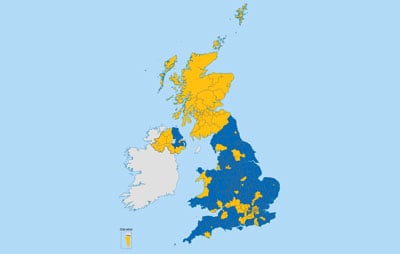
Physicists in the UK are coming to terms with the shock decision taken by the UK electorate to leave the European Union (EU). The withdrawal follows yesterday’s national referendum, which resulted in 51.9% of voters choosing to leave. The dramatic verdict throws up many deep and worrying questions about how UK physics will fare as a non-EU member.
Voters in the UK referendum were asked one simple question: “Should the United Kingdom remain a member of the European Union or leave the European Union?” Now that the UK has voted to leave, the UK’s prime minister will be expected to notify the European Council of the UK’s intention to withdraw. This will then set in place Article 50 of the EU’s governing Lisbon Treaty that will give the remaining 27 member states up to two years to decide on the arrangements for the withdrawal, including details of the UK’s future relationship with the EU.
Many scientists and officials – both within the UK and Europe – have voiced their fears about the damaging impact the vote will have on physics. Roy Sambles, president of the Institute of Physics (IOP), which publishes physicsworld.com, says there are “wide-ranging implications” of the UK leaving the EU, adding that membership has had a significant positive impact on UK science. He adds that membership has led to “some of the continent’s greatest scientific minds working in the UK” and that the current success and strength of UK physics and the wider scientific community “is very much entwined with the strength of research within Europe and around the world”.
Rolf-Dieter Heuer, president of the German Physical Society (DPG), says that the society “regrets” the decision. “Europe risks losing a strong and valuable research partner at a time when cross-border collaboration in science is needed more than ever,” says Heuer. “The solution to today’s demanding global challenges requires more internationally oriented science, not less. Rather than going our separate ways, we should be strengthening our international scientific ties.”
Heuer, a former director-general of the CERN particle-physics laboratory, says that the withdrawal will have “far-reaching consequences” for UK science and universities, with access to EU funding programmes becoming “significantly more difficult, if not impossible”, and that the mobility of UK researchers within Europe will be “compromised”. However, he adds that the DPG will continue to “strengthen and develop the very positive relationship” with the IOP and that he is convinced that UK researchers “will continue to show their strong commitment to European science”.
Changing times ahead
While EU cash for science in the UK only represents about 3% of the UK’s annual R&D expenditure across industry and academia, which stood at £30.6bn in 2014, UK science has traditionally done well out of EU funding. The UK’s Office for National Statistics estimates that the UK contributed €5.4bn between 2007 and 2013 to research spending in the EU and received back €8.8bn – an overall gain.
UK researchers were also successful when it came to winning grants from the EU Seventh Framework Programme, which ran from 2007 to 2013. Scientists in the UK came seventh overall, with a success rate of 22.6%. Over the same period, researchers from the UK won €1.7bn in grants from the European Research Council – 22.4% of the total and more than any other nation. The UK also receives about €1.1bn of Marie Skłodowska-Curie Actions – awards that enable researchers to work in different countries, sectors or disciplines.
Venki Ramakrishnan, president of the Royal Society, warns that any failure to maintain the free exchange of people and ideas between the UK and the international community, including Europe, “could seriously harm UK science”. He adds that many global challenges can only be tackled by countries working together. “In negotiating a new relationship with the EU we must ensure that we do not put unnecessary barriers in place that will inhibit collaborations,” says Ramakrishnan, who shared the 2009 Nobel Prize for Chemistry. “We must make sure that research, which is the bedrock of a sustainable economy, is not short-changed, and the government ensures that the overall funding level of science is maintained. One of the great strengths of UK research has always been its international nature, and we need to continue to welcome researchers and students from abroad.”
Free movement concerns
Paul Coxon, a materials scientist at the University of Cambridge, told physicsworld.com that the freedom of movement of researchers within the EU has allowed the UK to maintain its position as “one of the world’s science superpowers” but that is now at risk following the decision to leave. “The EU is now developing its own science policy to address the major challenges facing us in the future such as climate change, renewable energy and health. Leaving the EU means the UK will lose its role in helping set the agenda,” he adds.
The risk of losing the free movement of people to and from the UK also worries Sarah Main, director of the Campaign for Science and Engineering – a non-profit organization that promotes science and engineering in the UK. “The free movement of people in the EU made it easy for scientists to travel, collaborate and share ideas with the best in Europe and for companies and universities in the UK to easily access top talent from Europe,” she says, adding that it is now vital that science is “on the table” when discussions about the future of the UK’s relationship with the EU are made.
Remaining issues
Another vital issue is the UK’s contribution to major facilities in Europe such as CERN and the European Southern Observatory. It is possible for individual nations in these organisations to be non-EU members, but again that position would require a complex renegotiation. More difficult still is membership of facilities such as ITER (of which the EU as a whole is a member) as well as the European Space Agency, which is an independent intergovernmental organization, but which maintains close ties with the EU.
There is also a huge question mark over how quitting the EU will affect UK universities. According to the Higher Education Statistics Agency, some 14% of research and teaching staff in UK university departments are from non-UK EU countries. In physics departments, this figure rises to an average of 24%, although in some departments up to 50% of staff come from elsewhere in the EU.
Britain’s withdrawal will in addition affect the opportunities for international students coming to the UK. Non-UK EU students currently make up 5% of all students at UK universities and 17% of physics PhD students. EU students are treated as UK students for funding purposes, meaning that they are charged annual “home” fees of up to £9000, rather than the £18,000 or more paid by students from outside the EU. Recruitment of EU students could now become more complicated and more expensive, especially if EU students are subject to visa regulations.
Wendy Piatt, director-general of the Russell Group – a collection of 24 leading UK universities – warns that leaving the EU has now created “significant uncertainty” for UK universities. “The UK has not yet left the EU so it is important that our staff and students from other member countries understand that there will be no immediate impact on their status at our universities,” she says. “However, we will be seeking assurances from the government that staff and students currently working and studying at our universities can continue to do so after the UK negotiates leaving the EU.”
Julia Goodfellow, president of Universities UK, says leaving the EU will create “significant challenges for universities”. “Our first priority will be to convince the UK government to take steps to ensure that staff and students from EU countries can continue to work and study at British universities and to promote the UK as a welcoming destination for the brightest and best minds,” she says. “They make a powerful contribution to university research and teaching and have a positive impact on the British economy and society. We will also prioritize securing opportunities for our researchers and students to access vital pan-European programmes and build new global networks.”
Sambles, meanwhile, says that the IOP will continue to remind the UK government of the importance of science. “Whether the UK is in or out of the EU, science creates jobs and supports economic growth,” says Sambles. “We will be working with the government and the science community to ensure that these issues are being dealt with during the difficult negotiations of the next few months.”



